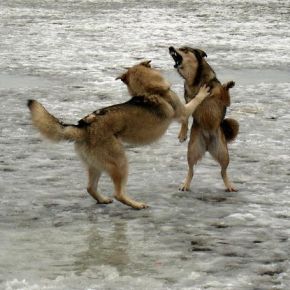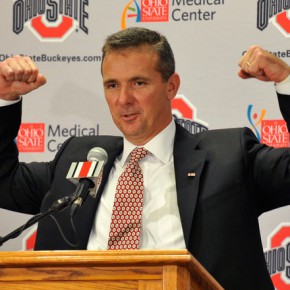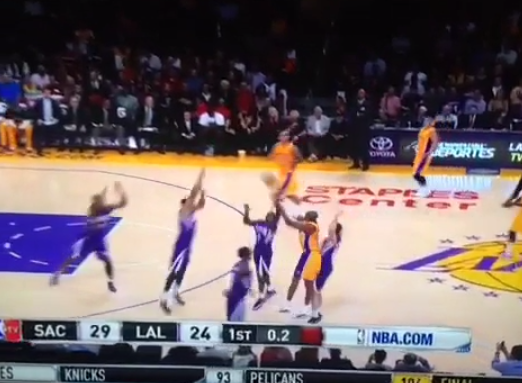
 Kobe Bryant and Urban Meyer – two guys at the top of their sports professions earlier this century (both leading their teams to multiple championships) – were in the news these past few weeks. Meyer, of course, on Monday night became only the 8th coach in NCAA history with three or more National Championships. This was certainly the most improbable of the three as his Ohio State Buckeyes (behind a 3rd string QB) manhandled Oregon by 3+ touchdowns. Meanwhile over at Grantland, Brian Phillips wrote a definitive piece on the downward trajectory of NBA icon Kobe Bryant (h/t DZ).
Kobe Bryant and Urban Meyer – two guys at the top of their sports professions earlier this century (both leading their teams to multiple championships) – were in the news these past few weeks. Meyer, of course, on Monday night became only the 8th coach in NCAA history with three or more National Championships. This was certainly the most improbable of the three as his Ohio State Buckeyes (behind a 3rd string QB) manhandled Oregon by 3+ touchdowns. Meanwhile over at Grantland, Brian Phillips wrote a definitive piece on the downward trajectory of NBA icon Kobe Bryant (h/t DZ).
Prior to the Oregon/Ohio State game Monday night, ESPN.com ran this interview with Urban Meyer’s sisters (Gigi and Erica). They spoke at length about the “new Urban Meyer”. Meyer had resigned from his head coach position at the University of Florida because of a scare with a heart issue related to the stress from the job. Kevin Van Valkenburg at ESPN.com talks about Myer’s last few years at Florida:
There was a time, not long ago, when Meyer grimaced and growled his way through the day with the disposition of an ornery badger. When irritated, his stare felt like it could melt a hole in your forehead. He snarled at reporters, stressed himself into a ball of knots (even after victories), and he generally looked miserable. But he built winners everywhere he went, and his two national titles at Florida earned him a reputation as one of the best in his profession. Sacrificing his personal happiness, especially in the cutthroat world of coaching football, seemed like an understandable trade-off to many.
Meyer took the 2011 season off before taking the head coach job at Ohio State in 2012. Gigi and Erica make it clear that their brother isn’t the same guy that left Florida as a shell of himself just a few years ago:
Here’s what happened: Meyer was chatting with the media after Ohio State’s surprising victory over Alabama in the College Football Playoff when a reporter casually mentioned, in the middle of a question, that Oregon had beaten Florida State by nearly 40 points in the other semifinal. Meyer — who had not yet heard the score of the Ducks-Seminoles game — looked incredulous, then awestruck.
“Oregon won by 40?” Meyer said. He seemed to wonder, briefly, if someone were playing a joke on him.
But then, after processing it, Meyer laughed. He leaned to his left, pretending to leave the press conference. “I got to go,” he said. “We’ve got to get ready for that one.”
“That moment was awesome,” said Gigi Meyer Escoe, the coach’s older sister. “It reminded me a lot of my dad, actually, the way his eyes got all wide and then he scrunched his face up. Urban has a good sense of humor. People miss that.”
“When [starting QB] Braxton Miller was injured, I called him and asked him how he was dealing with it,” said Erica Meyer Judd, Meyer’s younger sister. “He said, ‘I’ve learned to accept the things I cannot change.’ I’m sure every day he says the prayer about ‘Lord, give me the serenity to accept the things I cannot change, the strength to change the things I can and the wisdom to know the difference.'”
Urban Meyer (new man, new championship, newly found sense of humor) has apparently embraced the Serenity Prayer (authored by Reinhold Niebuhr and embraced fully by Alcoholics Anonymous). Meyer’s public persona (even “post” most recent NCAA Championship) has changed from stressed out, driven, win at all cost curmudgeon to broken, appreciate the small stuff, smile at the press-conference, “serenity now” embracing coach/father/brother/mentor example. Meyer is increasing, but more interestingly, he’s doing it from an apparent place of genuine brokenness.
Kobe Bryant, on the other hand, still playing for a bad Lakers team, is (according to Phillips) holding fast to an individual mindset in a team sport environment:
It’s funny, for one thing. It’s always funny when a person’s self-image drastically exceeds the reality, and it’s doubly so when the person is as arrogant as Kobe. The crowd may worship success, but it also accrues small resentments toward athletes who hold themselves aloof. Kobe isn’t precisely hated, but now that success is deserting him, the crowd is happy enough to see his insolence brought to earth. This Lakers season has been a bizarre clinic in bad-tempered screwball, a farce made of missed 15-foot jumpers. He’s shooting under 38 percent, by far the lowest rate of his career; this month, he missed his 13th straight potentially game-tying or go-ahead field goal attempt in the last five seconds of the fourth quarter, his worst stretch of clutch shooting ever.
I want to make the case, though, that this season has also been a kind of gift. It’s thrown Kobe’s essential qualities into relief. It’s helped us understand him better. That look of hard, mad, small-eyed determination reads a little more starkly when everything is going to pieces than it does up 12 in the Finals. What were the odds, anyway, that Kobe would end up marooned in such a dramatically perfect situation? A tyrant, he’s facing large-scale rebellion; a loner, he’s surrounded by enemies, on his own team and in every arena he enters. The NBA’s most self-willed star, he’s discovering the limits of what his will can do.
Kobe going “lone wolf” this season for a last second shot against all five Sacramento Kings players (it didn’t go in)
Most fascinating though, is Phillips’ portrayal of Bryant as a “past his prime” alpha male:
A few months ago, I read The Jungle Book to my 8-year-old niece. She listened with huge eyes to Kipling’s story of talking wolves and vengeful tigers and the Law of the Jungle; as soon as we were finished, she demanded to hear it again. One of the places where her eyes got biggest was the part about Akela, the Lone Wolf, who rules the pack from atop the Council Rock. Do you remember this? It’s silly, like Kobe Bryant, and also kind of moving, like Kobe Bryant. Akela is strong and cunning. But he knows that one day he must lose his strength, and that when that happens, the young wolves will challenge him and pull him down and kill him — which, of course, nearly happens in the course of the story. There’s a lot of talk in basketball about players who are alpha dogs; an October 2013 Sports Illustrated cover depicted Kobe as the last of the breed. But ask my niece what happens when alpha dogs reach the end.
Kobe is clearly reaching the end. It’s the end of a great career, and he’ll go down as the second best guard of all time, clearly after Michael Jordan. Unlike Meyer, however, Kobe’s next phase doesn’t have a second “phoenix rising” chapter. We are left with two men, two sports, two different types of adversity (Kobe’s include rape allegations and saving face on a bad team at the end of a career) and apparently two different responses to the “death blow” – the moment in which brokenness is fully realized (h/t CB), and two alpha dogs passing in the night.

COMMENTS
Leave a Reply














